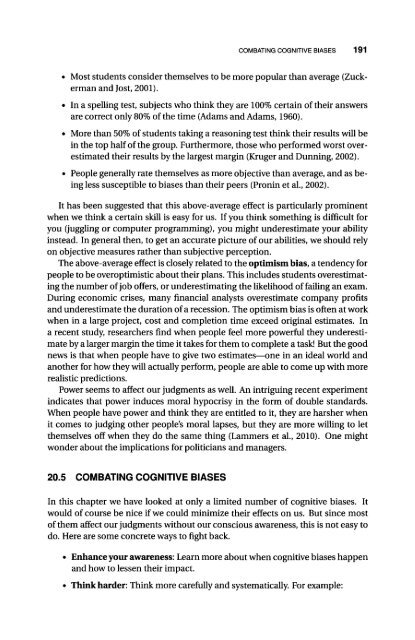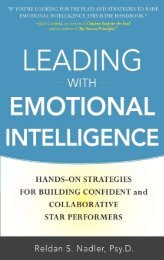An Introduction to Critical Thinking and Creativity - always yours
An Introduction to Critical Thinking and Creativity - always yours
An Introduction to Critical Thinking and Creativity - always yours
Create successful ePaper yourself
Turn your PDF publications into a flip-book with our unique Google optimized e-Paper software.
COMBATING COGNITIVE BIASES 191<br />
• Most students consider themselves <strong>to</strong> be more popular than average (Zuckerman<br />
<strong>and</strong> Jost, 2001).<br />
• In a spelling test, subjects who think they are 100% certain of their answers<br />
are correct only 80% of the time (Adams <strong>and</strong> Adams, 1960).<br />
• More than 50% of students taking a reasoning test think their results will be<br />
in the <strong>to</strong>p half of the group. Furthermore, those who performed worst overestimated<br />
their results by the largest margin (Kruger <strong>and</strong> Dunning, 2002).<br />
• People generally rate themselves as more objective than average, <strong>and</strong> as being<br />
less susceptible <strong>to</strong> biases than their peers (Pronin et al., 2002).<br />
It has been suggested that this above-average effect is particularly prominent<br />
when we think a certain skill is easy for us. If you think something is difficult for<br />
you (juggling or computer programming), you might underestimate your ability<br />
instead. In general then, <strong>to</strong> get an accurate picture of our abilities, we should rely<br />
on objective measures rather than subjective perception.<br />
The above-average effect is closely related <strong>to</strong> the optimism bias, a tendency for<br />
people <strong>to</strong> be overoptimistic about their plans. This includes students overestimating<br />
the number of job offers, or underestimating the likelihood of failing an exam.<br />
During economic crises, many financial analysts overestimate company profits<br />
<strong>and</strong> underestimate the duration of a recession. The optimism bias is often at work<br />
when in a large project, cost <strong>and</strong> completion time exceed original estimates. In<br />
a recent study, researchers find when people feel more powerful they underestimate<br />
by a larger margin the time it takes for them <strong>to</strong> complete a task! But the good<br />
news is that when people have <strong>to</strong> give two estimates—one in an ideal world <strong>and</strong><br />
another for how they will actually perform, people are able <strong>to</strong> come up with more<br />
realistic predictions.<br />
Power seems <strong>to</strong> affect our judgments as well. <strong>An</strong> intriguing recent experiment<br />
indicates that power induces moral hypocrisy in the form of double st<strong>and</strong>ards.<br />
When people have power <strong>and</strong> think they are entitled <strong>to</strong> it, they are harsher when<br />
it comes <strong>to</strong> judging other people's moral lapses, but they are more willing <strong>to</strong> let<br />
themselves off when they do the same thing (Lammers et al., 2010). One might<br />
wonder about the implications for politicians <strong>and</strong> managers.<br />
20.5 COMBATING COGNITIVE BIASES<br />
In this chapter we have looked at only a limited number of cognitive biases. It<br />
would of course be nice if we could minimize their effects on us. But since most<br />
of them affect our judgments without our conscious awareness, this is not easy <strong>to</strong><br />
do. Here are some concrete ways <strong>to</strong> fight back.<br />
• Enhance your awareness: Learn more about when cognitive biases happen<br />
<strong>and</strong> how <strong>to</strong> lessen their impact.<br />
• Think harder: Think more carefully <strong>and</strong> systematically. For example:
















